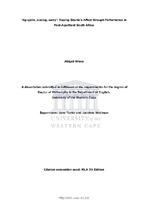| dc.contributor.advisor | Taylor, Jane | |
| dc.contributor.advisor | Moolman, Jacobus | |
| dc.contributor.author | Wiese, Abigail | |
| dc.date.accessioned | 2021-09-06T10:14:08Z | |
| dc.date.available | 2021-09-06T10:14:08Z | |
| dc.date.issued | 2021 | |
| dc.identifier.uri | http://hdl.handle.net/11394/8420 | |
| dc.description | Philosophiae Doctor - PhD | en_US |
| dc.description.abstract | In this study I investigate what performance as a medium can contribute to our
understanding of shame's affect. Given the difficulty of defining and concretising affect
according to set parameters and outcomes, critical and dynamic debates about its
nature continue. Most recently, New Affect theorists such as Brian Massumi have
explored the role of the body in affective meaning-making. Our current social context
requires a critical engagement with the forms of affect in order to achieve a deeper
understanding of the intangible structures of power and oppression, as well as of
desire, interest and pleasure. My aim is to determine the ways in which performance
– as a medium through which to navigate an often difficult, evasive and deeply
subjective experience – can facilitate a knowledge of how bodies experience, relate to
and process shame. | en_US |
| dc.language.iso | en | en_US |
| dc.publisher | University of Western Cape | en_US |
| dc.subject | Performance studies | en_US |
| dc.subject | Embodied cognition | en_US |
| dc.subject | Post apartheid | en_US |
| dc.subject | South Africa | en_US |
| dc.subject | Performance arts | en_US |
| dc.title | ‘Ag sjeim, siestog, sorry’: Tracing shame’s affect through performance in post-apartheid South Africa | en_US |
| dc.rights.holder | University of Western Cape | en_US |

